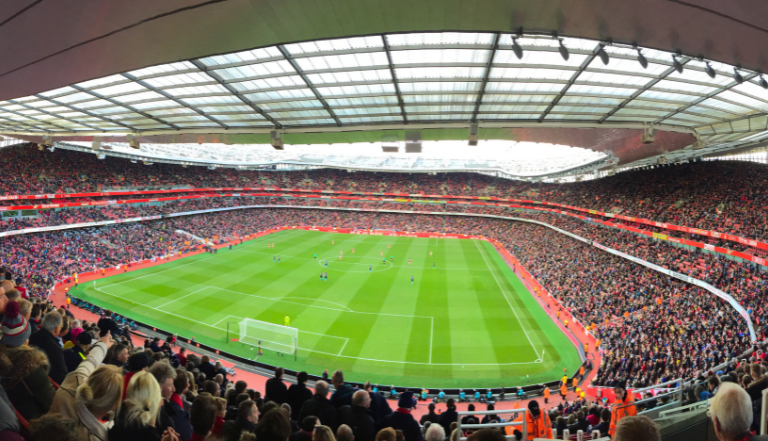Over the last 30 years, the Premier League has become one of the biggest and most lucrative sports leagues in the world; putting the English game at the top of the football pyramid. One large driver of this success is the Premier League’s stance on innovation, and how maintaining an innovative attitude towards adoption of new technologies, broadcasting strategies and global marketing has taken the league from strength to strength.
Looking at the tech strategy of the Premier League for the upcoming season, fan engagement remains top of the agenda for the development of the league. To enhance the experience for fans all over the world, the Premier League signed its most substantial technology deal to date in partnership with Oracle in 2021. This partnership with Oracle allows the Premier League to use cloud infrastructure to absorb and analyse the league’s data assets, including historical match data and real-time information supplied by the league’s official data partners, such as player tracking, which is collected via computer vision techniques.
In 2024, developments to Oracle’s machine learning models continue to improve and transform this data into various insights that are distributed via the league’s broadcast and digital channels. Metrics such as ‘average formation’, ‘live win probability’ and ‘momentum tracker’ (the likelihood of the team in possession scoring a goal in the next five minutes) all help to add to the spectator experience by giving viewers a deeper understanding of what’s happening on the pitch, further driving engagement and social media activity.
Additionally, the league has also migrated its entire historical video archive to Oracle Cloud Infrastructure (OCI), to help reduce costs, drive efficiency and unlock a range of new capabilities for the league’s broadcasting operations. The archive comprises every single Premier League match, along with pre and post-match interviews. This archive is to be used by the league itself, its broadcast and commercial partners, documentary makers, advertisers, and other licensees, further help drive the revenue of the league.
On the fan-facing side, Sony’s Pulselive continues to work with the league’s digital channels, relaunching its official website and consolidating multiple functions, including the official Fantasy Premier League, into a single native mobile application complete with live data, videos and localised content.
Gaming has also become an unignorably important factor for all major sports leagues over the last five years, especially from a fan engagement perspective. While no longer holding the designation of official technology partner, in 2024 EA Sports remains a key partner for the league. The publisher has now signed a six-year extension to its partnership with the Premier League, allowing it to continue using the league’s intellectual property in its video games, and ensure gamers remain connected with the league. This season will also see the Premier League expand its video game ambitions, as the league is now fully licensed in EA Sports soccer simulation series, with EA FC 25 also powering official esports tournaments. A more flexible licensing framework from the Premier League has also allowed other publishers to use its intellectual property in other categories, further expanding the league’s reach.
Manchester-based Rezzil is also creating the Premier League’s first official virtual reality (VR) game, using official Premier League data to allow fans to put themselves in the boots of their favourite player and recreate iconic goals and historic moments in an immersive digital environment.
On the gaming front, it is perhaps the most recent agreement with Sports Interactive’s Football Manager that is of the greatest significance. As the ‘official football management game’ of the Premier League, Football Manager 2025 will be the first edition of the series to include official logos, kits and player photos, with further integrations promised throughout the partnership. Access to the intellectual property of the league and its teams further enhances the gamer experience, adding to the engagement momentum with this group of fans.
Sorare is now also the official blockchain fantasy sports licence holder, agreeing a four-year deal with the Premier League in what is the league’s most significant foray into Web 3.0 to date.
As the official low latency data partner of the Premier League, Genius Sports (in cooperation with Football DataCo) continues to collect data from every single player in every single match to power new statistics and visualisations for broadcast partners and betting markets for bookmaker partners alike.
Genius Sports also continues to develop on its skeletal tracking computer vision technology that powers semi-automated offside technology (SAOT, as implemented in Euro 2024), to collect positional data that can digitally recreate an entire pitch. These digital recreations can unlock a range of content and commercial possibilities, including new second screen experiences, virtual and augmented reality (VR/AR) applications, and even entire metaverse environments that put fans in the middle of the action.
The GeniusIQ AI platform will also capture real-time data to make rapid, accurate decisions, and create broadcast-quality graphics to be used by the league's media partners.
Finally, the Premier League’s expanding interest in technological innovation has seen it join the Comcast NBCUniversal SportsTech Accelerator, which provides resources and opportunities to early-stage sports technology startups. A new cohort will be admitted next year, giving the league and its two most important broadcast partners, NBC and Sky Sports, the ability to identify and assist technologies that could benefit the Premier League in the future.
Therefore, from the developments for the 2024/25 season alone, we get an idea of how the Premier League’s innovative attitude and great knowledge of the value of their intellectual property, and how this can be leveraged, has helped the league become a sporting behemoth.



